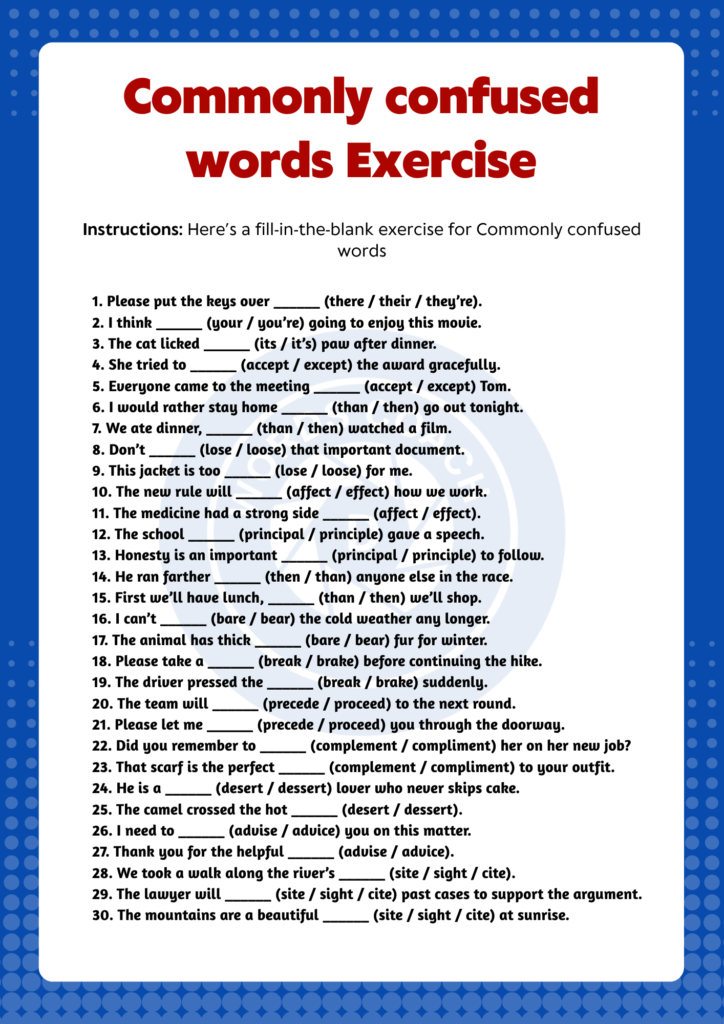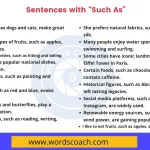Commonly Confused Words Quiz
Commonly Confused Words in English
English has many words that sound alike, look similar, or have meanings that overlap. These pairs and groups often cause mistakes in both writing and speech. Knowing the difference is important because a single wrong word can change the meaning of a sentence.
Why They’re Tricky
Some words are homophones—they sound the same but have different spellings and meanings, like there, their, and they’re. Others look alike but serve different roles, such as affect (verb) and effect (noun). Because our ears can’t tell them apart, we have to rely on context and spelling.
Common Examples
1. There / Their / They’re
- There refers to a place or idea: “Put the book over there.”
- Their shows ownership: “Their house is on the corner.”
- They’re is a contraction of they are: “They’re going to the park.”
2. Your / You’re
- Your is possessive: “Is this your phone?”
- You’re means you are: “You’re late for the meeting.”
3. Its / It’s
- Its shows possession: “The dog wagged its tail.”
- It’s stands for it is or it has: “It’s going to rain.”
4. Affect / Effect
- Affect is usually a verb meaning to influence: “Lack of sleep can affect your mood.”
- Effect is a noun meaning result: “The medicine had a quick effect.”
5. Accept / Except
- Accept means to receive or agree: “She accepted the gift.”
- Except means not including: “Everyone came except John.”
6. Than / Then
- Than is used for comparisons: “She runs faster than me.”
- Then refers to time or sequence: “We ate dinner, then went for a walk.”
7. Lose / Loose
- Lose means to misplace or fail: “Don’t lose your keys.”
- Loose means not tight: “The shirt is too loose.”
8. Principle / Principal
- Principle is a rule or belief: “Honesty is an important principle.”
- Principal is a person in charge or the main part: “The school principal spoke at the assembly.”
Commonly confused words Exercise
Here’s a 30-question fill-in-the-blank exercise to practice commonly confused words.
- Please put the keys over __ (there / their / they’re).
- I think __ (your / you’re) going to enjoy this movie.
- The cat licked __ (its / it’s) paw after dinner.
- She tried to __ (accept / except) the award gracefully.
- Everyone came to the meeting __ (accept / except) Tom.
- I would rather stay home __ (than / then) go out tonight.
- We ate dinner, __ (than / then) watched a film.
- Don’t __ (lose / loose) that important document.
- This jacket is too __ (lose / loose) for me.
- The new rule will __ (affect / effect) how we work.
- The medicine had a strong side __ (affect / effect).
- The school __ (principal / principle) gave a speech.
- Honesty is an important __ (principal / principle) to follow.
- He ran farther __ (then / than) anyone else in the race.
- First we’ll have lunch, __ (than / then) we’ll shop.
- I can’t __ (bare / bear) the cold weather any longer.
- The animal has thick __ (bare / bear) fur for winter.
- Please take a __ (break / brake) before continuing the hike.
- The driver pressed the __ (break / brake) suddenly.
- The team will __ (precede / proceed) to the next round.
- Please let me __ (precede / proceed) you through the doorway.
- Did you remember to __ (complement / compliment) her on her new job?
- That scarf is the perfect __ (complement / compliment) to your outfit.
- He is a __ (desert / dessert) lover who never skips cake.
- The camel crossed the hot __ (desert / dessert).
- I need to __ (advise / advice) you on this matter.
- Thank you for the helpful __ (advise / advice).
- We took a walk along the river’s __ (site / sight / cite).
- The lawyer will __ (site / sight / cite) past cases to support the argument.
- The mountains are a beautiful __ (site / sight / cite) at sunrise.
Answer:
- there
- you’re
- its
- accept
- except
- than
- then
- lose
- loose
- affect
- effect
- principal
- principle
- than
- then
- bear
- bear
- break
- brake
- proceed
- precede
- compliment
- complement
- dessert
- desert
- advise
- advice
- site
- cite
- sight
Download the Word Coach Application





